NrWS 1 N N VICK
Page 54
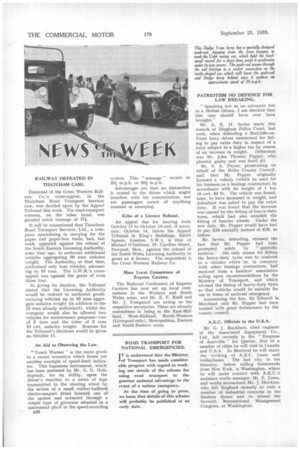
Page 55
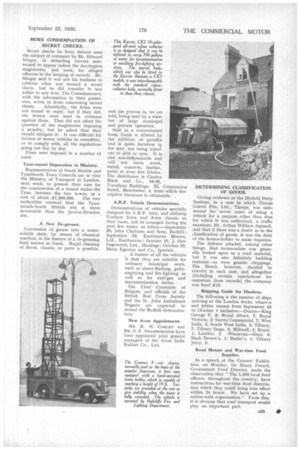
Page 56
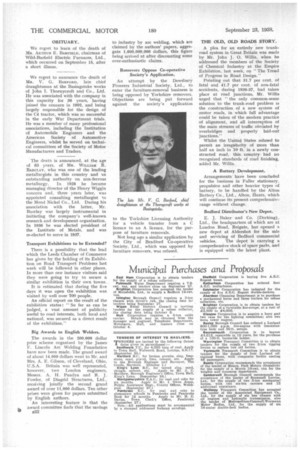
Page 57
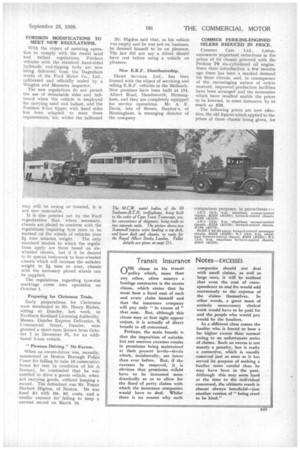
Page 58
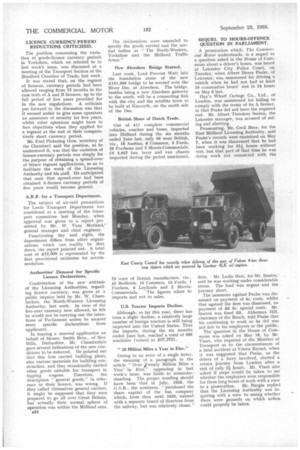
If you've noticed an error in this article please click here to report it so we can fix it.
RAILWAY DEFEATED IN THATCHAM CASE.
Dismissal of the Great Western Railway Co.'s cross-appeal, in the Thatc.ham Road Transport Services case, was decided upon by the Appeal Tribunal this week. The road-transport concern, on the other hand, was granted extra tonnage of 171.
It will be remembered that Thatcham Road Transport Services, Ltd., a company specializing in carrying for the paper and paper-box trade, had, last week, appealed against the refusal of the South Eastern Licensing Authority, some time ago, to authorize additional vehicles aggregating 60 tons unladen weight. The Authority, at that time, authorized only four vehicles, amounting to 15 tons. The G.W.R.'s crossappeal was against the grant of even those four.
In giving its decision, the Tribunal stated that the Licensing Authority would be ordered to authorize goodscarrying vehicles up to 10 tons aggregate unladen weight (in addition to the 15 tons already authorized), whilst the company would also be allowed two vehicles for maintenance purposes—one of 5 tons and the other of 2 tons 10 cwt. unladen weight. Reasons for the Tribunal's decisions would be given on October 11.
An Aid to Observing the Law.
"Touch Warner" is the name given to a recent invention which forms yet another example of speed-limit indicator. This ingenious instrument, which has been patented by Mr. G. G. Holt, depends, for its utility, upon the driver's reaction to a series of taps transmitted to the steering wheel by the action of a small rubber-buffered electro-magnet fitted beneath one of the spokes and actuated through a simple type of _governor situated in a convenient place in the speed-recording n20 system. This " message " occurs at 301 m.p.h. or 20/ m.p.h.
Advantages are that no distraction is caused to the driver which might interfere with his concentration, nor are passengers aware of anything unusual or annoying.
Echo of a Licence Refusal.
An appeal due for hearing from October 11 to October 13 and, if necessary, October 14, before the Appeal Tribunal in King's Buildings, Smith Square, London, S.W.1, is that of Michael O'Sullivan, 27, Caroline Street, Newport, Mon., against the refusal of the South Wales Licensing Authority to grant an A licence. The respondent is the Great Western Railway Co.
More Local Committees of Express Carriers.
The National Conference of Express Carriers has now set up local committees in the Western and South Wales areas, and Mr. E. F. Knill and Mr. J. Freeguard are acting as the respective secretaries. There are already committees in being in the East-Midland, West-Midland, North-Western (Liverpool only), Metropolitan, Eastern and South-Eastern areas. PATRIOTISM NO DEFENCE FOR LAW BREAKING.
" Speaking not as an advocate but as a British citizen, I am shocked that this case should have ever been brought."
Mr. A. E. H. Sevier made this remark at 13ingl3arn Police Court, last week, when defending a Radcliffe-onTrent lorry driver summoned for failing to pay extra duty in respect of a lorry subject to a higher tax by reason of an increase in weight. Defendant was Mr. John Thomas Pepper, who pleaded guilty and was fined El.
Mr. S. A. Payne, prosecuting on behalf of the Notts County Council. said that Mr. Pepper originally licensed a vehicle (which he used for his business as a haulage contractor) in accordance with its weight of 1 ton 19 cwt. 83 lb. The vehicle was found, later, to have increased in weight, and defendant was asked to pay the extra duty. It was found that the increase was caused by the fitting of heavy-duty tyres, which had also entailed the fitting of heavier wheels. Under the new duty, Mr. Pepper would have had to pay £30 annually instead of £25, as before.
Mr. Sevier, defending, stressed the fact that Mr. Pepper had been prompted solely by " patriotic motives." His only reason for fitting the heavy-duty tyres was to conform to a circular which he, in company with other haulage contractors, had received from a hauliers' association acting upon recommendations by the Ministry of Transport, and which advised the fitting of heavy-duty tyres so that vehicles would be suitable for use in times of national emergency.
Announcing the fine, Sir Edward le. Marchant said Mr. Pepper had been treated 'with great forbearance by the county council.
A.E.C. Officials in the U.S.A.
Mr. G. J. Rackhana, chief engineer of the Associated Equipment Co., Ltd., left recently in the " Empress of Australia '• for Quebec, first of a number of cities he will visit in Canada and U.S.A. In Montreal he will study the werking of A.E.C. buses and trolleybuses. The last city in his itinerary, before sailing homewards from New York, is Washington, where he will make contact with A.E.C. 's assistant works manager, Mr, E. Jones, and works accountant, Mr. J. Hawkins, who left England recently to visit a number of industrial concerns in the Eastern States and to attend the Seventh teternational Management Congress, at Washington. MORE CONDEMNATION OF SECRET CHECKS.
Secret checks on lorry drivers were the subject of comment by Mr. Edward Slinger, in defending drivers summoned to appear before the Accrington magistrates, last week, for alleged offences in the keeping of records. Mr. Slinger said it was not his business to criticize what was termed a secret check, but he did consider it was unfair to any firm. The Commissioners, with the information in their possession, wrote to firms concerning record sheets. Admittedly, the firms were not bound to reply, but if they did, the letters were used in evidence against them. That did not affect the question of the magistrates imposing a penalty, but he asked that they should mitigate it. It was difficult for drivers of motor vehicles to remerbber, or to comply with, all the regulations going out day by day.
Fines were imposed in a number of cases.
Tyne-tunnel Deputation to Ministry.
Representatives of South Shields and Tynemouth Town Councils are to visit the Ministry of Transport in London, next week, to present their case for the construction of a tunnel under, the Tyne, between the two towns, at a cost of about.£1,300,000. The two authorities contend that the Tynemouth-South Shields site is more favourable than the Jarrow-Howdon site.
A New De-greaser.
Conversion of grease into a watersoluble state, by means of chemical reaction, is the feature of a de-greasing fluid known as Gunk. Rapid cleaning of floors, chassis,. or parts is possible, and the process is, we are told, being used by a number of large municipal and private operators.
Sold in a concentrated form, Gunk is diluted by the addition of paraffin and is quite harmless to the user, not being injurious to skin or eyes. It is also non-inflammable and will not harm wood, metal, concrete, leather, paint or even fine fabrics. The distributor is Charles Mack and Co., 84-85, Trevelyan Buildings, 52, Corporation Street, Manchester, 4, from which descriptive literature is obtainable. _ A.R.P. Vehicle Demonstrations.
Demonstrations of vehicles specially designed for A.R.P. duty, and utilizing Forthon 2-ton and 3-ton chassis as their bases, will be arranged during the next few weeks, as follow:—September 20, John Chalmers and Sons, Redhill ; September 24, Eastbourne 'Motors, Ltd., Eastbourne; October' 10, J. Hollingsworth, Ltd„ Hastings; October 16, Mann Egerton and Co., Ipswich.
A feature of all the vehicles is that they are suitable for ordinary municipal work, such as street-flushing, gully. emptying and fire-fighting. as well as for anti-gas and decontamination duties.
The Chief Constable of Reigate, and officials of the British Red Cross Society and the St. John Ambulance Brigade are expected to attend the Redhill demonstration.
New Avon Appointment.
MR. R. H. CORILEY and MR. 0.F. SWANBOROUGH have been appointed joint general managers of the Avon India Rubber Co., Ltd.
DETERMINING CLASSIFICATION OF GOODS.
Giving evidence at the BIofield Petty Sessions, in a case in which Thorpe Gravel Pits, Ltd., Thorpe, was summoned for seven cases of using a vehicle for a purpose other than that for which it was authorized, a traffic examiner, Mr. Arthur William Aspinall, said that if there was a doubt as to the classification of goods, it was the duty of the licence-holder to make inquiries.
The defence pleaded, among other things, that tarmacadam was generally looked upon as a road material, but it was also definitely building material—as were granite chippings. The Bench, however, decided to convict in each case, and altogether (including certain convictions for omissions from records) the company was fined £19.
Shipping Guide for Hauliers.
The following is the number of ships arriving at the London docks, wbarv:ts and jetties named from September 23 to October 1 inclusive:—Doms—King George V. 8; Royal Albert, 7; Royal Victoria, 2; Surrey Commercial, 7; West India, 5; South West India, 2; Tilbury, 7; Tilbury Stage, 3; Millwall, 4; Royal, 1; London, 2. Wu/taws—Hays, 13; Mark Brown's, 1; Butler's, 1; Tilbury Jetty, 3.
Road Motors and War-time Food Supplies.
In a speech at the Grocers' Exhibition, on Monday, Sir Henry French, Government Food Director, made the observation that "The 1,500 local food officers, throughout the country, have instructions for war-time food distribution which they could bring into effect within 24 hours. We have set up a nation-wide organization." From this, it is obvious that road transport would
play an important part. a21 • OBITUARY.
Weregret to learn of the death of MR. ARTHUR E. BARFIELD. chairman of Wild-Barfield Electric Furnaces, Ltd., which occurred on September 15, after a short illness.
We regret to announce the death of MR. V. G. BARRORD, late chief draughtsman at the Basingstoke works of John I. Thomycroft and Co., Ltd. He was associated with the company in this capacity for 36 years, having joined the concern in 1902, and being largely responsible for the design of the C4 tractor, which was so successful in the early War Department trials. He was a member of many professional associations, including the Institution of Automobile Engineers and the American Society of Automotive Engineers, whilst he served on technical committees of the Society of Motor Manufacturers and Traders.
Th,e deatn is announced, at the age of 63 years, of MR. WILLIAM R. BARCLAY, who was one of the leading metallurgists in this country and an outstanding authority on non-ferrous metallurgy. In 1928 he became managing director of the Henry Wiggin concern and, three years later, was appointed consulting metallurgist ,:o the Mond Nickel Co., Ltd. During his association with the latter, Mr. Barclay was largely instrumental in 5nitiating the company's well-known research and development organization. In 1936 he was elected president of the Institute of Metals, and was re-elected to serve in 1937.
Transport Exhibitions to be Extended?
There is a possibility that the lead which the Leeds Chamber of Commerce has given by the holding of its Exhibition on Road Transport Problems last week will be followed in other places. In more than one instance visitors said they were going to try to secure a similar exhibition in their own towns, It is estimated that during the five days it was open the exhibition was visited by well over 700 people.
An official report on the result of the exhibition states: "So far as can be judged, a vast amount of publicity useful to road interests, both local and national, was secured as a direct result of the exhibition."
Big Awards to English Welders.
The awards in the 200,000 dollar prize scheme organized by the James F. Lincoln Arc Welding Foundation have now been made. The grand award of about 14,000 dollars went to Mr. and Mrs. A. E. Gibson, of Cleveland, Ohio, U.S.A. Britain was well represented. however, two London engineers, Messrs. A. H. Pandva and R. J. Fowler, of Diagrid Structures, Ltd., receiving jointly the second grand award of over 11,000 dollars. Ten other prizes were given for papers submitted by English authors.
An interesting feature is that the award committee finds that the savings B22
to industry by arc welding, which are claimed by the authors' papers, aggregate 1,600,000,000 dollars, this figure being arrived at after discounting some over-enthusiastic claims,
Removers Oppose Co-operative Society's Application.
An attempt by the Dewsbury Pioneers Industrial Society, Ltd., to enter the furniture-removal business i5 being opposed by Yorkshire removers. Objections are being put forward against the society's application to the Yorkshire Licensing Authority for a vehicle transfer from a C licence to an A licence, for the purpose of furniture removals.
Not long ago a similar application by the City of Bradford Co-operative Society, Ltd., which was opposed by furniture removers, was refused. THE OLD, OLD ROADS STORY.
A plea for an entirely new trunk. road system in Great Britain was made by Mr. John J. 0. Willis, when he addressed the members of the Society of Chemical Industry at the Empire Exhibition, last week, on " The Trend of Progress in Road Design."
Pointing out that 31.7 per cent of fatal and 41.7 per cent, of non-fatal accidents, during 1936-37, had taken place at road junctions, Mr. Willis urged that " the only common-sense solution to the trunk-road problem is the construction of a new system of motor roads, in which full advantage could be taken of the modern practice of alignment, and all interruption of the main streams of traffic obviated by overbridges and properly laid-out junctions."
Whilst the United States refused to permit an irregularity of more than half an inch in 10 ft. in a newly constructed road, this 'country had no recognized standards of road finishing, added Mr. Willis_ A Battery Development.
Arrangements have been concluded for the business in Fuller stationary, propulsion and other heavier types of battery, to he handled by the Alton Battery Co„ Ltd., Alton, Hants, which will continue its present comprehensive range without change.
Bedford Distributor's New Depot.
E. J. Baker and Co. (Dorking), Ltd., the headquarters of which are at London Road, Reigate, has opened a new depot at Aldershot for the sale and servicing of Bedford commercial vehicles. The depot is carrying a comprehensive stock of spare parts, and is equipped with the latest plant. FORDSON MODIFICATIONS TO MEET NEW REGULATIONS.
With the object of assisting operators to comply with the recent sand and • ballast regulations, Fordson vehicles with the standard fixed-sided hydraulic end-tipping body are now being delivered from the Dagenham works of the Ford Motor Co., Ltd., calibrated and officially sealed by a Weights and Measures inspector.
The new regulations do not permit .the use of detachable sides and tailboard when the vehicle is employed for carrying sand and ballast, and the Fordson 3-ton tipper with fixed sides has been adapted to meet these requirements; for, whilst the tailboard
may still he swung or lowered, it is not now removable.
It is also pointed out by the Ford organization that, where necessary, chassis are plated to conform with the regulations requiring tyre sizes to be marked on the wheels of vehicles over
2f tons unladen weight. The only standard models to which the regulations apply are those based on sixwheeled chassis, but if it be desired to tit special bodywork to four-wheeled chassis which will increase the unladen weight to 2.1E tons or over, chassis with the necessary plated wheels can be supplied.
The regulations regarding tyre-size markings come into operation on October 1.
Preparing for Christmas Trade.
Early preparations for Christmas were mentioned to Mr. Henry Riches, sitting at Dundee, last week, as Northern Scotland Licensing Authority. Messrs. Dundee Express Deliveries, 6, Commercial Street, Dundee, were granted a short-term licence from October 1 to December 31, for an additional 1-ton vehicle.
"Pleasure Driving" No Excuse.
When an owner-driver was, recently, summoned at Boston Borough Police Court for failing to take 10 consecutiv3 hours for rest (a condition of his A licence), he contended that he was entitled to drive a goods vehicle, when not carrying goods, without keeping a record. The defendant was Mr. Frank Herbert Higdon, of Boston. He was fined £1 with 10s. 6d. costs, and a similar amount for failing to keep a current record on March 16. Mr. Higdon said that, as his vehicle was empty and he was not on business,•he deemed himself to be on pleasure.
The law did not say a driver should have rest before using a vehicle on pleasure.
New E.R.F. Distributorship.
Diesel Services, Ltd., has been formed with the object of servicing and selling E.R.F. vehicles in the Midlands New premises have been built at 124, Albert Road, Handsworth, Birmingham, and they are completely equipped for service operations. Mr. A. E. Davis, late of Messrs. Buxton's, of Birmingham, is managing director of the company. COMME R PE RKINS-ENGINED OILERS REDUCED IN PRICE.
Commer Cars Ltd., Luton, announces important reductions in the prices of its chassis powered with the Perkins P6 six-cylindered oil engine. Since their introduction a few months ago there has been a marked demand for these chassis, and, in consequence of the encouraging nature of orders received, improved production facilities have been arranged and the economies which have resulted enable the prices to be lowered, in some instances, by as much as £26.
The following prices are now effective, the old figures which applied to the prices of these chassis being given, for
comparison purposes, in parentheses :—
LN.5 10-ft. 6-in. wheelbase normal-control chassis, 4524 (£5491; forward-control chassis, 4538 (4563).
LN.5 13-ft. 9-in. wheelbase normal-control chassis, 4534 (4559); forward-control chassis, 4548 (4573).
PLNF.5 24-26-seater forward-control passenger chassis, 4609 (4629); N.5 10-ft. 6-in, wheelbase forward-control chassis. 4604 (4630); N.5 13-ft. 9-id. wheelbase forward-control chassis, 4604 146301.
LICENCE CURRENCY-PERIOD REDUCTIONS CRITICIZED.
The position concerning the variation of goods-licence currency periods in Yorkshire, which we referred to in last week's issue, was discussed at a meeting of the Transport Section of the Bradford Chamber of Trade, last week.
It was stated that, on the regrant of licences, currency periods had been allowed ranging from 13 months in the case both of A and B licences, up to the full period of five years provided for in the new regulations. A criticism put forward in the discussion was that it seemed unfair to give some operators an assurance of security for five years, whilst other operators might have to face objections when they applied for a regrant at the end of their comparatively short currency period.
Mr. Fred Pickering (hon. secretary of the Chamber) said the position, as he understood it, was that the variation of licence-currency periods was simply for the purpose of obtaining a spread-over of future regrant applications, so as to facilitate the work of the Licensing Authority and his staff. He anticipated that once that spread-over had been obtained A-licence currency periods of five years would become general.
A.R.P. for a Transport Department.
The subject of air-raid precautions for Leeds Transport Department was considered at a meeting of the transport committee last Monday, when approval was given to a report presented by Mr. W. Vane Morland,' general manager and chief engineer.
Functioning day and night, the department differs from other organizations which can readily be shut down, the report pointed out. A total cost of £18,000 is represented by the first provisional estimates for accommodation.
Authorities' Demand for Specific Licence Declarations.
Confirmation of the new attitude of the Licensing Authorities, regarding licence currency, was given at a public inquiry held by Mr. W. Chamberlain, the North-Western Licensing Authority, last week. In view of the five-year currency now allowed, he felt he would not be carrying out the intentions of Parliament unless he secured more specific declarations from applicants.
In hearing a renewal application on behalf of Messrs. Smith Bros., of New Mills, Derbyshire, Mr. Chamberlain gave several indications of the new conditions to he enforced. He pointed out that this firm carried building plant, also various materials for building construction, and they occasionally carried other goods suitable for transport in tipping wagons. Therefore, the description " general goods," in reference to their licence, was wrong. If they called themselves general carriers, it might be supposed that they were prepared to go all over Great Britain, but actually their normal sphere of operation was within the Midland area.
824 The declarations were amended to specify the goods carried and the normal radius as "The North-Western, Yorkshire and the Midland Traffic Areas."
New Aberdeen Bridge Started.
Last week, Lord Provost Watt laid the foundation stone of the new £151,000 bridge to be erected over the River Dee, at Aberdeen. The bridge, besides being a new Aberdeen gateway to the south, will be a connecting link with the city and the satellite town to be built at Kincorth, on the south side of the Dee.
British Share of Dutch Trade.
Out of 411 complete commercial vehicles, coaches and buses, imported into Holland during the six months ended 3une last, only 59 were British, viz., 18 Austins, 8 Commers, 5 Fords, 26 Fordsons and 2 Morris-Commercials. Of 2,057 bus, lorry and van chassis imported during the period mentioned.
79 were of British manufacture, viz.. 45 Bedfords, 10 Commers, 15 Fords, 1 Fordson, 6 Leylands and 2 Morris Commercials. The figures relate to imports and not to sales.
U.S. Tractor Imports Decline.
Although, so far this year, there has been a slight decline, a relatively large number of foreign tractors is still being imported into the United States. Thus the imports, during the six months ended June last, reached a total of 686 machines (valued at £57,272).
"20 Million Miles a Year in Eire."
Owing to an error of a single letter. the meaning of a paragraph in the article " Over iwenty Million Miles a Year in Eire," appearing in last week's issue, was liable to misunderstanding. The proper wording should have been that in July, 1929, the G.S.R.. the nominees, "purchased the share capital of the bus company which, from then until 1933, existed with a separate board of directors from the railway, but was relatively closer." SEQUEL TO HOURS-OFFENCE QUESTION IN PARLIAMENT.
A prosecution which, The Commercial Motor understands, is a sequel to a question asked in the House of Commons about a driver's hours, was heard at Leicester City Police Court, on Tuesday, when Albert Henry Peake, of Leicester, was summoned for driving a vehicle when he had not had at least 10 consecutive hours' rest in 24 bouts on May 6 last.
Hay's Wharf Cartage Co., Ltd., of London, was summoned for failing to comply with the terms of its A licence, in that Peake did not have the required rest. Mr. Albert Theodore Seaton, the Leicester manager, was accused of aiding and abetting.
Prosecuting, Mr. Cecil Bray, for the East Midland Licensing Authority, said Peake's records were examined on May 7, when it was discovered that he had been working for 51i hours without rest, but that part of that time he was doing work not connected with the firm. Mr. Leslie Hale, for Mr. Seaton,' said he was working under considerable stress. The load was urgent and the journey short.
The summons against Peake was dismissed on payment of 4s. costs, whilst that against the firm was dismissed, on payment of £5 5s. special costs. Mr. Seaton was fined £5. Alderman Hill, chairman of the Bench, told Peake that his continuing to work as he did was not fair to his employers or the public.
The question in the House of Commons was asked on May 18, by Mr. Viant, who inquired of the Minister of Transport as to the circumstances of a fatal accident at Friem Barnet, when it was suggested that Peake, as the driver of a lorry involved, started a return journey from London after a rest of only 2-1 hours. Mr. Viant also asked if steps would be taken to see whether the employers were responsible for these long hours of work with a view to a prosecution. Mr. Burgin replied that the Licensing Authority was inquiring with a view to seeing whether there were grounds on which action could properly be taken.












































































































































